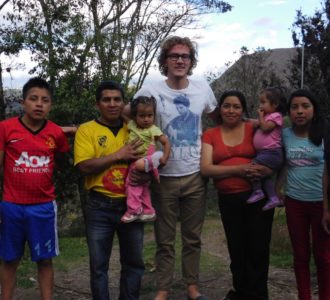I’ve been in Pamar Chacrin for one week. In this town of 83 short, Ecuadorean, farming families, I stick out like broccoli in a carrot patch.
This week has been rough for me. In Quito I was welcomed into an upper-middle class home with all the commodities I had back in Chapel Hill. I could understand and communicate with my host parents, and saw my friends every day for Spanish class. It was hardly culture shock. Upon arriving in Pamar Chacrin last Saturday, however, culture shock hit my like I never thought it would. My house always smells like animals. There is a thin layer of dirt and boot tracks on the vinyl flooring. In place of a trashcan in the kitchen, we’ve got a bucket to collect slop for the chanchos, the pigs. Because of the electric water heater wired to the shower head, the lights turn off in the bathroom when the shower is in use. These are not life-altering differences, but what made it all that much harder was that my Spanish felt useless. The accent here in Pamar Chacrin is quite different than it is in Quito, and I imagine it will be quite a while before I manage to adapt my classroom-learned Spanish to the more mangled Spanish thats spoken here in the campo.
Despite my determinedly open and curious mind, my first reaction at discomfort was to yearn for home. In this intensely new environment I found it very difficult to stay present and positive, something that I don’t usually struggle with. This culmination of homesickness and culture shock made for a few very difficult days at the beginning of the week. I cried for the first time since leaving home. I locked myself in my room and lost myself in music, or movies, simple distractions. I didn’t want to immerse, and enrich myself.
About half-way through the week though, I talked with some friends, and with my INCREDIBLE team leader Steph, and came to a sort of conclusion. It unfortunately makes sense for culture shock and homesickness to give you the ol’ one-two. If you’re feeling out of place in a new environment, then of course you’ll imagine yourself at home, wherever or with whomever you feel most comfortable. After talking with Steph I now know it is OK to feel homesick. And OK to feel culture shock, but its how I react that will define my year.
For me one of the hardest things about this week was the solidarity and silence that comes with field work. There I was on my first day of work, hand-tilling a field with a million thoughts of home and the people I miss racing through my head. I felt trapped inside my own head. I craved human interaction. Without it I felt like a ticking time bomb about to explode into an emotional breakdown I wanted so badly to avoid. For this reason, I am going to start helping out at my local escuela of about fifty elementary school aged kids. I’ve decided splitting my time with the school and farm work will allow me the social aspect of work that I was lacking in the field, but also give me time to develop an appreciation and respect for the hardy farm work that my community members do every day.
Tomorrow I leave for Regional Training Seminar, where I will reconvene with my provincial cohort and enjoy a few days together. We will talk about our wins and our struggles, and how we’re going to build on the wins to overcome the struggles. When I return, I will begin Training Block 1, my first of three seven week chunks this year. And it will be amazing.
I took this picture with my family today. From left to right is Javier (16), Miguel (My dad, I don't know how old he is), Yadira (almost 2), Me, Lina (My wonderful mother), Katerin (almost 2), Gisela (12), and Luis Miguel (14). They have been so kind and welcoming, and I surely wouldn't have made it through this week without them.
